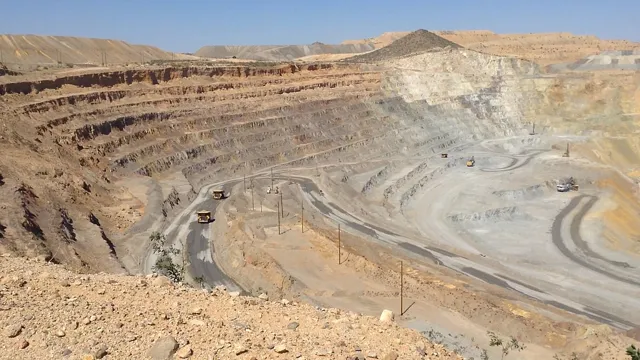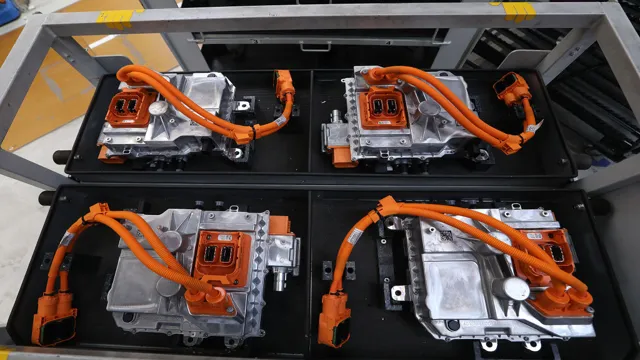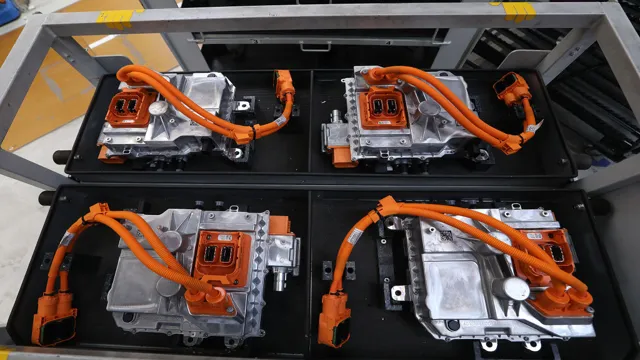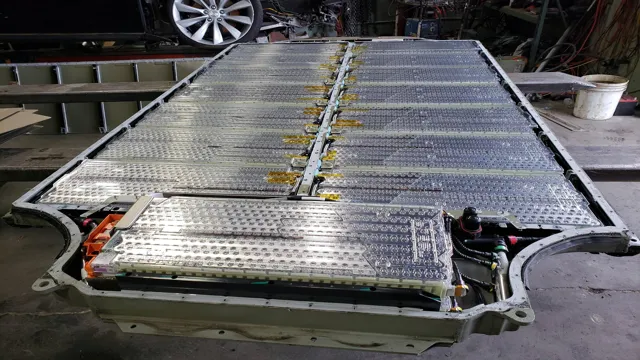Uncovering the Truth about Electric Car Battery Mining and Fuel Consumption
Are you curious about how electric car battery mining affects fuel consumption? With the increasing popularity of electric cars, there is a growing concern about the environmental impact of battery production and disposal. While electric cars offer a cleaner alternative to traditional gasoline-powered vehicles, the mining and production of their batteries still contribute to fuel consumption. In this blog post, we will explore the impact of electric car battery mining on fuel consumption and what it means for the future of sustainable transportation.
So buckle up and let’s dive into the world of electric cars and battery mining!
What is Electric Car Battery Mining?
Electric car battery mining refers to the process of extracting the materials that are used to make lithium-ion batteries that power electric vehicles. This mining is usually associated with the demand for materials such as lithium, cobalt, nickel and manganese which are found in sources like the earth’s crust, in deep-sea beds, or even in some asteroids. Electric car battery mining has come under scrutiny because of the amount of resources and fuel consumption required in the extraction process and transportation of the materials.
Critics argue that it is not always environmentally friendly or sustainable in the long-term. However, proponents argue that it is necessary for the growth of the electric vehicle industry, and research is underway to make the process more efficient and sustainable with advancements in recycling and more environmentally friendly mining practices. The growing demand for electric vehicles is putting pressure on the supply chain for these materials, which is why it’s important for the industry to find more sustainable ways to mine and extract them.
Overview of the Process
Electric car battery mining is the process of extracting raw materials like lithium and cobalt from the earth to manufacture batteries for electric vehicles. Mining companies use heavy machinery and drilling techniques to extract these materials from the ground, which are then processed and purified before being used in battery production. This process is essential to the production of electric cars, as batteries are the most critical component of the vehicle’s power source.
However, electric car battery mining is not without its challenges, with concerns around the environmental impact of mining activities and the ethical implications of using materials sourced from certain countries. Nonetheless, with the increasing demand for electric vehicles, it is becoming more crucial than ever to find sustainable ways of sourcing the materials needed to power these vehicles.
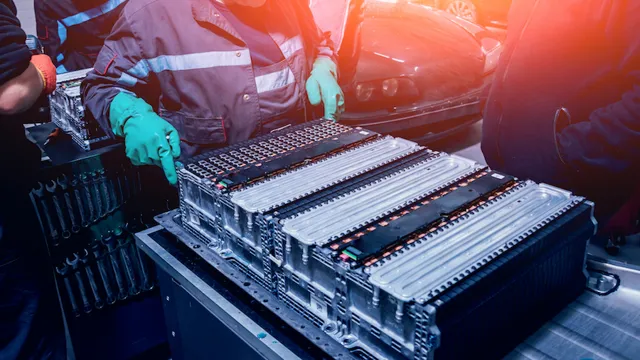
Environmental Concerns
Electric car battery mining is the process of extracting the raw materials that go into making the lithium-ion batteries needed to power electric vehicles. The most common materials used are lithium, cobalt, nickel, and manganese, which are found in various forms in the earth’s crust. However, the mining process can have significant environmental impacts, such as biodiversity loss, water and air pollution, and soil degradation.
Additionally, some of the minerals, like cobalt, are often mined in developing countries with lax environmental regulations and poor labor conditions. This can result in social and ethical concerns surrounding their extraction. While electric vehicles represent a step towards a greener future, their production requires the necessary resources that come at an environmental cost.
Therefore, more sustainable and ethical mining practices need to be implemented to ensure the long-term viability of this growing industry.
Electric Cars and Fuel Consumption
Electric cars are becoming increasingly popular due to their environmentally-friendly nature. However, there are concerns about the fuel consumption of electric cars, particularly when it comes to mining the materials needed for their batteries. While it is true that mining for battery materials can have a negative impact on the environment, the overall fuel consumption of electric cars is still significantly lower than that of traditional gasoline-powered vehicles.
In fact, studies have shown that electric cars are up to three times more efficient at converting energy into motion than gasoline-powered cars. Additionally, advancements in battery technology are allowing for longer ranges and faster charging times, making electric cars more practical for everyday use. Overall, while there is room for improvement in the sustainability of electric car battery mining, the fuel efficiency benefits of electric cars are clear.
Comparison to Gasoline Cars
When comparing electric cars to gasoline cars, one of the most significant differences lies in their fuel consumption. In an electric car, the “fuel” is electricity, which can be obtained from a variety of sources, including solar panels. As opposed to gasoline cars, which rely entirely on fossil fuels that emit harmful gases into the atmosphere, electric cars offer a cleaner, more eco-friendly alternative.
While electric cars do require charging, some models offer a range of up to 300 miles, making it possible to travel long distances without needing to stop for fuel. Overall, electric cars are a great choice for those looking to reduce their carbon footprint and lower their fuel costs in the long run. With many automakers focusing on producing more electric models, the future looks bright for this innovative and environmentally conscious mode of transportation.
Factors that Affect Fuel Consumption
When it comes to fuel consumption, electric cars offer a much more efficient and eco-friendly option than traditional gas-powered vehicles. Unlike gas cars, electric cars utilize rechargeable batteries to propel them forward, eliminating the need for gasoline consumption. While electric vehicles do still consume energy, they require significantly less of it than their gas-guzzling counterparts.
This is because electric vehicles convert up to 77% of their energy into motion, while gas cars convert only 12-30% of theirs. This means that not only are electric cars better for the environment, but they’re also more cost-effective in the long run, as they require less energy to travel the same distance. So, if you’re looking to reduce your carbon footprint and save money on gas expenses, an electric car may be the way to go.
Electric Cars and Range Anxiety
Electric cars are becoming more and more popular, but a common concern that many people have is range anxiety. This refers to the fear that an electric car will run out of power before the driver reaches their destination. However, there are ways to mitigate this concern.
One of the most important factors to consider is fuel consumption. Just like gasoline-powered cars, electric cars have varying levels of fuel efficiency. Factors like speed, driving conditions, and vehicle weight can all play a role in fuel consumption.
It’s important for drivers to research the specific make and model of electric car they are interested in and understand how far it can go on a single charge. By doing so, drivers can plan their route accordingly and avoid experiencing range anxiety. Additionally, other factors such as fast charging stations and route-planning apps can also help reduce range anxiety for electric car drivers on longer trips.
Ultimately, with the right information and tools, drivers can enjoy the benefits of electric cars without worrying about running out of power.
How Mining Affects Fuel Consumption for Electric Cars
When it comes to electric cars, many people believe that they are environmentally friendly. However, the truth is that electric car battery mining can have an impact on fuel consumption. This is because the production of electric car batteries involves the extraction of metals such as lithium, nickel, and cobalt, which requires energy-intensive processes.
These processes contribute to greenhouse gas emissions, which in turn can lead to increased fuel consumption. In addition, the transportation of these materials from mining sites to processing plants also adds to the fuel consumption footprint. That being said, it’s important to remember that electric cars are still more fuel-efficient than traditional gasoline-powered vehicles.
But, as we move towards promoting more sustainable energy alternatives, we must also consider the impact of the materials that go into producing these alternatives, including their effects on fuel consumption.
Energy Intensity of Mining Lithium and Other Materials
The energy intensity of mining lithium and other materials is a crucial consideration for the growing electric car industry. While electric vehicles (EVs) produce fewer emissions than traditional combustion engines, the production of their batteries requires significant amounts of energy. Lithium-ion batteries make up the majority of EVs, but their production requires large amounts of water and energy.
Mining lithium can require vast amounts of water and energy due to the extraction process, which involves pumping brine into evaporation ponds. Additionally, the mining of other materials, such as cobalt and nickel, required for battery production, can also contribute to high energy consumption. These materials are often extracted from remote locations, requiring significant transportation and infrastructure, thus increasing the carbon footprint of battery production.
Therefore, it is crucial for the EV industry to consider the sources and methods of obtaining these materials to reduce the fuel consumption and overall environmental impact of electric vehicles.
Transportation of Materials
Electric Cars, Fuel Consumption, Mining, Transportation of Materials Mining plays an essential role in the transportation of materials that go into making electric cars. The materials needed for electric vehicle production include aluminum, cobalt, lithium, and rare earth minerals, which are commonly mined in different parts of the world. However, the transportation of these materials from the mining sites to the production facilities can significantly impact fuel consumption.
The further the materials have to travel, the greater the reliance on fuel-based transportation, such as cargo ships, planes, and trucks. Ultimately, this can have a negative effect on the overall carbon footprint of electric car production. Therefore, manufacturers are increasingly sourcing materials that are closer to production facilities to reduce fuel consumption and transportation costs while minimizing their environmental impact.
What Can Be Done to Reduce the Impact?
As electric cars become more popular, the demand for electric car batteries is increasing, which in turn leads to more lithium and other minerals mined from the earth. Mining these minerals takes a significant amount of energy and contributes to greenhouse gas emissions. To reduce the impact of electric car battery mining on the environment, there are several steps that can be taken.
One option is to invest in research and development of battery technologies that rely less on minerals such as lithium. Another option is to increase the recycling of existing batteries to reduce the need for new mining. Some car manufacturers are already implementing more sustainable practices by using recycled materials in their batteries.
Additionally, as more renewable energy sources such as wind and solar power are used to power the mining operations, the overall impact can be further reduced. By taking steps to minimize the environmental impact of electric car battery mining and fuel consumption, we can continue to move towards a more sustainable future.
Recycling and Reusing Batteries
Recycling batteries properly is essential to reducing their environmental impact. Batteries contain heavy metals and chemicals that can leach into the soil and waterways if not disposed of properly. To make a difference, we can start by recycling batteries at designated drop-off locations or through mail-back programs.
Some companies also offer take-back programs for their own products, so it’s worth checking with the manufacturer. Additionally, we can consider reusing batteries whenever possible. For example, rechargeable batteries can be used multiple times, reducing the need for constant disposal.
Overall, by properly recycling and reusing batteries, we can work towards a more sustainable future and lessen our impact on the environment.
Alternative Battery Technologies
One way to reduce the impact of current lithium-ion battery technology is to explore alternative battery technologies. There are several promising alternatives, including solid-state batteries, flow batteries, and sodium-ion batteries. Solid-state batteries use a solid electrolyte instead of a liquid one, which reduces the risk of leakage and fire.
Flow batteries store energy in two liquid electrolytes and offer flexibility in terms of power and capacity. Sodium-ion batteries are similar to lithium-ion batteries but use sodium instead, which is more abundant and less expensive. By investing in and advancing these alternative battery technologies, we can reduce our reliance on finite and environmentally damaging resources and move towards a more sustainable energy future.
Development of Sustainable Mining Practices
Mining practices have a profound impact on the environment, and we need to take action to ensure that our planet is not irreversibly damaged. One way to do this is to develop sustainable mining practices that reduce the impact on Earth’s natural resources. One approach is to use renewable energy instead of fossil fuels to power mining operations.
This will reduce carbon emissions and minimize the impact on climate change. Additionally, we can use more environmentally friendly techniques for the extraction of minerals and metals, such as bioleaching, which uses bacteria to extract metal from ores, rather than traditional mining processes that can pollute water sources. Ultimately, we need to prioritize sustainable mining practices to ensure that our planet is healthy for future generations.
Conclusion
In conclusion, when it comes to electric car battery mining fuel consumption, it’s not just a matter of comparing gasoline usage to mining electricity. We must also take into account the environmental costs and sustainability of mining practices. While electric cars may seem like the cleaner choice on the surface, we need to ensure that the materials used in their production are obtained responsibly.
So let’s aim for a future where the energy used to power our vehicles is harnessed sustainably and in harmony with our planet. In other words, let’s be electric car enthusiasts, not electric car environmentalists.”
FAQs
How is mining for electric car batteries impacting the environment?
Mining for electric car batteries can have various environmental impacts such as soil and water pollution, deforestation, and habitat destruction for wildlife. However, technological advancements and regulations are being developed to minimize these impacts.
Is electric car battery mining more harmful than traditional fuel extraction?
Both types of extraction have their environmental impacts and negative consequences. However, the overall impact of electric car battery mining largely depends on the sourcing and extraction methods used.
What is the current rate of fuel consumption by electric cars compared to traditional vehicles?
Electric cars consume significantly less fuel than traditional vehicles. They can run for hundreds of miles on a single charge, whereas gasoline-powered vehicles have limited fuel range before requiring a refill.
How can we reduce the environmental impact of electric car battery mining?
To reduce the impact of mining for electric car batteries, companies can source materials responsibly and prioritize environmental regulations and ethical labor practices in their supply chains. Additionally, developing alternative and sustainable sources of energy, such as renewable energy, can reduce the demand for mining raw materials.
